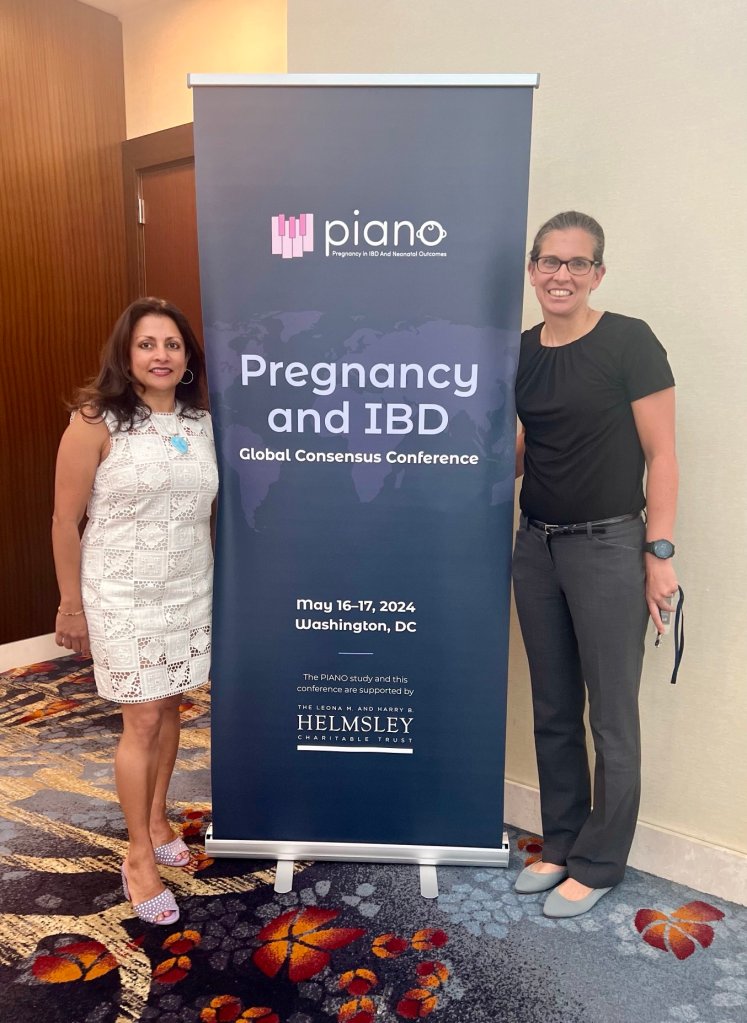One of the main challenges and worries women face when it comes to pregnancy and IBD is feeling comfortable and confident staying on their medication. The first-ever Global Consensus Conference on Pregnancy and IBD was held during Digestive Disease Week (May 2024) and part of the discussion focused on the latest recommendations for medication during pregnancy and lactation. Last week on Lights, Camera, Crohn’s we covered the global guidance regarding pre-conception counseling and family planning.
Hear from the co-chairs of the Global Consensus Conference and esteemed gastroenterologists, Dr. Uma Mahadevan and Dr. Millie Long about what they want the IBD community to know about medication during pregnancy and postpartum.

The latest recommendations for IBD women
- All biologics can be continued through pregnancy and lactation
- 5ASA can be continued
- Thiopurines can be continued, but monitor liver enzymes for intrahepatic cholestasis of pregnancy
- S1P agents and JAK inhibitors should be avoided in pregnancy unless there is no other viable alternative
- Biosimilars are equally safe to originator drugs (biologics) in pregnancy
- Wound healing after C-section/episiotomy: Thiopurines
delayed wound healing with episiotomy, but there’s no impact of biologics on
wound healing with C-section, tear, episiotomy
These recommendations were voted on and determined by more than 50 medical providers and IBD patient advocates from around the world. The hope is that this guidance will leave couples feeling empowered and more comfortable in their decision to stay on medications that are deemed low risk.

“We have learned that there are many different practice patterns in various locations globally regarding treating women with IBD during pregnancy. The goal of this Global Consensus was to have a consistent, evidence-based framework for management of pregnant women with IBD that will improve the quality of care globally. Most importantly, treating inflammation and continuing appropriate medications (such as biologics) improves outcomes for both mom and baby,” said Dr. Millie Long.
When I was pregnant with my children, I trusted what my care team (GI, OB, and Maternal Fetal Medicine doctors) told me regarding Humira and the risk versus benefit of staying on my medication through pregnancy and after. I credit my medication for keeping my Crohn’s under control while I carried my babies and after I brought them into this world. But I’m going to be honest—when you are 36 weeks pregnant and you feel the baby kicking and moving as you’re about to do your injection, it can feel emotional. At the same time, I always told myself I was doing what was best for me and for them. Now that my kids are 7, 5, and almost 3 (all perfectly healthy), I am reminded every day that I made the right choice for our family.

Handling the hesitations
Dr. Mahadevan says when patients come to her worried about staying on their medication while they are pregnant, she discusses the “very clear data” that shows disease activity is the strongest predictor of pregnancy complications.
“This includes having difficulty conceiving, higher miscarriage rates, higher complications of pregnancy, including pre-term birth. Pre-term birth has a strong correlation with reduced socioeconomic status and other issues later in life. Plus, if women are so sick and worn out by their IBD, they aren’t able to enjoy their new baby and struggle to take care of their child as well as they would like to. For medications like monoclonal antibody, where there is good safety data, it really makes sense to continue.”
“Women should stay on biologics during pregnancy without any alteration when they are pregnant. This reduces the risk of flare during and post pregnancy for the mom and improves outcomes for the baby. The strongest predictor of pre-term delivery (and the complications arising from this), is active inflammation,” said Dr. Long.
Clinical trials in pregnancy and drug safety rely on observational data. There are no randomized trials where one person is chosen to get therapy, and another is not.
“This is where the PIANO study and other such prospective (where we follow patients before we know the outcome) registries are so important. We can collect data quickly… as soon as a medication is approved for use. We also get data from large population datasets from countries such as France, where all patients are registered, and their outcomes can be collected. This takes longer but will have much larger numbers,” explained Dr. Mahadevan.
All three of my kids were part of research studies while in utero and after. My youngest who turns three in July was part of the PIANO study. I can’t say enough about the importance of contributing to research and helping to pave the way for future IBD families. We have the guidance we have today because of all the moms who took it upon themselves to be a part of studies like PIANO.

Biosimilars in pregnancy
As more and more patients are switched from a biologic to a biosimilar, there’s a great deal of interest in how this impacts family planning and pregnancy.
A total of 89 pregnant women with IBD enrolled in PIANO on Infliximab were included as part of a study presented at Digestive Disease Week entitled, “Use of Biosimilars to Infliximab During Pregnancy in Women with Inflammatory Bowel Disease: Data from the PIANO study” that Dr. Long and Dr. Mahadevan were a part of.
In the study, 76 women were on the originator drug (Infliximab/Remicade), while 13 women were on an Infliximab biosimilar.
“Though this study is small, Europeans noted that they did not differentiate between biosimilar and originator in their studies. There were no difference in clinical characteristics or significant differences in any pregnancy complications between the two groups. Developmental milestones were assessed at 12 months, with no differences in communication, fine motor, gross motor, personal/social interaction, or problem solving between groups,” said Dr. Mahadevan.
This data and ongoing research can reassure mothers with IBD on biosimilar IFX who wish to pursue pregnancy.
Avoiding S1P agents and JAK inhibitors in pregnancy
For those who don’t know—S1P agents and JAK inhibitors include: Ozanimod (Zeposia), Tofacitinib (Xeljanz) and Upadacitinib (Rinvoq).
If you’re currently taking one of these medications and finally have your IBD under control, it can be daunting to know what to do next for family planning.
“It is a case-by-case situation .In general, we would like to avoid these agents as, unlike with biologics which are antibodies, these agents are pills and cross the placenta during the first trimester during a key time in the baby’s development,” said Dr. Mahadevan. “Animal studies have shown harm with supratherapeutic (higher than human doses) levels of drug. Upadacitinib (Rinvoq) had birth defects in animals even at human doses. For S1Ps, usually there is another effective medicine patients can try. An exception may be if they also have multiple sclerosis as S1Ps are used to treat both conditions. For jak inhibitors, they are often the only effective therapy for a patient. We will discuss the risks, the benefits, and the options – using a surrogate, etc.”
Lactation considerations
The benefits of breastfeeding are similar in IBD and non-IBD moms.
“We do not have robust data that breastfeeding will specifically reduce the risk of IBD in offspring, but there are many studies in the general population that demonstrate that breastfeeding is beneficial to infants. The choice to breastfeed is an individual one, and it is important to support each family’s decision,” said Dr. Long.
Breastfeeding research is more challenging than pregnancy studies, as this is not collected in medical records or large databases.
“Breastfeeding research is data from registries like PIANO and individual studies from different IBD centers, which measure transfer in breastmilk and outcomes,” said Dr. Mahadevan.
She went on to say that breastfeeding is allowed on thiopurines, and there should be low to no risk to the infant.
“Ideally, if the mother can wait four hours, there is no drug transferred, but even earlier the amount that is transferred is very low,” explained Dr. Mahadevan.
As an IBD mom who fed each of my babies differently, I want to reiterate that whether you choose to breastfeed or not is a personal decision and you are not less than or a failure if you need to supplement or formula feed. Juggling chronic illness, postpartum, and motherhood is a lot. Give yourself grace and trust your child will thrive no matter how they are fed.
My oldest was only breastfed for three days because I wasn’t well-versed about the data regarding biologics and breastfeeding and because I was nervous about flaring and not being able to feed my baby. I breastfed my middle child for 6 months while supplementing, and my youngest was exclusively breastfed 14 months—all while on Humira. Your journey and your experience are personal to you. Try not to allow outside or societal pressure to contribute to your guilt as an IBD mom.

Gaps and strides in IBD research
Dr. Long says we need more data on the safety and efficacy of novel small molecules during pregnancy.
“This includes medications like tofacitinib, Upadacitinib, Etrasimod and ozanimod. This is why registries like PIANO are so important, to capture this information and inform patients and providers alike. Some of the strides being made in IBD pregnancy research include the effectiveness of pre-conception counseling, novel assessments of disease activity during pregnancy (such as intestinal ultrasound), data on novel biologics during pregnancy and lactation (including newly approved therapies such as Risankizumab or Mirikizumab) and data specifically on biosimilars. Through this data and the Consensus recommendations, we can improve pregnancy outcomes for many women with IBD,” said Dr. Long.
The overall hope is that the Global Consensus Conference recommendations will provide women with IBD all over the world with consistent and evidence-based care prior to, during, and post pregnancy.
